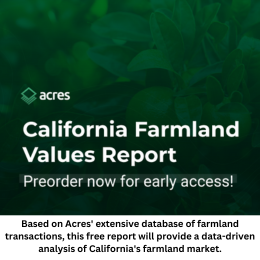April 12, 2018
A$500,000 raised by Adelaide-based startup T-Provenance will help pilot its blockchain technology with Northern Australian mango producers. The project includes a A$300,000 grant from the Cooperative Research Center for Developing Northern Australia (CRCNA), as well as Data61.
Availer, the agtech betaworks responsible for co-founding T-Provenance, is working on commercialization at this point, said Andrew Grant, co-founder of Availer. “Our core focus is on commercialisation. From day-one we engaged with industry on what’s the price point and what’s the real value we can bring to the industry, and obviously we’re very thankful the CRC for Northern Australia,” Grant told InnovationAus.com.
CRCNA, which will manage the two-year project, was established by the Australian government as part of a A$6.2 billion commitment to help businesses, governments, and researchers work together. It has pledged to invest A$75 million over the next 10 years in support of agriculture and food, tropical health service, and traditional owner-led business development.
In the pilot, T-Provenance will work with Queensland’s Growcom – which is the peak representative body for that area’s horticulture industry – and mango producer Manbulloo, which has six family-owned mango farms across Northern Australia and is the largest grower of Kensington Pride mangoes in the country. Sensors and smart chips will be used to monitor variables such temperature, humidity, and other parameters in order to ensure food safety, quality, traceability and authenticity all along the supply chain from farm to retailer.
The data will be fed through T-Provenance’s Ethereum-based private blockchain layer, with accessibility provided to interested parties – distributors, wholesalers, producers – through a dashboard.
“What we’re looking for in the supply chain is the blind spots and where there are opportunities to improve or remove things that could be reducing the quality of mangoes, which can lead to a reduction in shelf life, price point and margin,” Grant said.
And the pilot is just the beginning as Grant said there is opportunity to see this technology applied elsewhere, particularly in helping with implementation and adoption problems, which he said is a prime issue in the industry.
Building the Block
T-Provenance joins a growing list of companies investing in blockchain and other traceability technologies. In January of this year, BlockGrain, an Australian agtech-blockchain startup, raised the equivalent of approximately $1 million in cryptocurrency from the $90 million NEM Blockchain Investment Fund.
And in August of 2017, Earth Twine, a collaborative technology company dedicated to bringing leading edge technologies to bear on traditional food supply chains, and Stratis, a developer and provider of end-to-end blockchain solution applications partnered to launch The Earth Twine-Stratis Platform, the world’s first blockchain platform dedicated to the seafood industry.
Previously, Filament, which has offices in Reno, Nevada, Denver, and San Francisco, and which is a product of the Techstars accelerator program, raised $5 million in Series A funding in 2015, and in March 2017 raised $15 million in new venture financing, to advance TAP, a platform used for the purpose of sharing soil data from a particular field among farmers.
Additionally, California-based Skuchain also has developed a blockchain platform for barcodes and RFID tags designed to prevent counterfeiting which has already being applied to the agriculture industry.
By Michelle Pelletier Marshall, GAI Media

Let GAI News inform your engagement in the agriculture sector.
GAI News provides crucial and timely news and insight to help you stay ahead of critical agricultural trends through free delivery of two weekly newsletters, Ag Investing Weekly and AgTech Intel.




